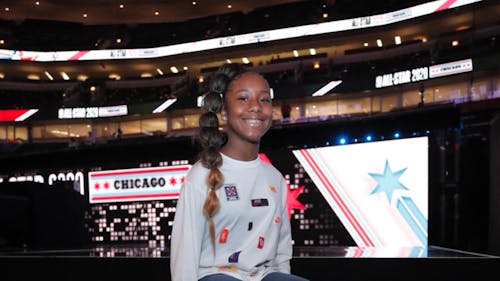Black creators like Jalaiah Harmon deserve recognition

The internet has had a resurgence of dance crazes and trendy topics taking the world of pop culture by storm. Viral videos such as the Harlem Shake, the whip and Nae Nae dance and the Mannequin Challenge are all dances powered by the accessibility of the internet. Ease of use and relatability encourage other people to follow the trend until it reaches a peak and eventually loses steam.
A lesser known, yet important, fact is that the individuals who originate these viral dances are people of color. People of color create these trends, but it is white social media users who receive the credit and popularity.
Jalaiah Harmon, the creator of the popular "Renegade" dance used in TikTok, created the choreography for the dance to the K CAMP single. It quickly swept the internet, with other TikTokers and content creators doing their own rendition of her choreography. But, when the dance was featured at the NBA All-Star Slam Dunk Contest, and TikTok dancers Addison Easterling and Charli D’Amelio were invited to perform instead of Harmon.
There is nothing inherently wrong with these individuals, but they were not the ones who created the dance and therefore did not deserve to be the ones elevated to perform it. It was only after much backlash and public outcry that Harmon was invited to perform.
While Harmon did perform the dance with Easterling and D'Amelio, it was only due to the extraordinary efforts of the internet that she was able to receive the credit she deserves. It's rare that Black creators are given the platform they deserve.
This constant diminishing of Black achievement perpetuates the notion that Black creatives do not matter in today’s all-consuming society, and that popularity is more important than originality when it comes to creativity.
This phenomenon of Black creators not receiving the credit they deserve is vindictive of a systemic pattern of white people taking credit when standing on the shoulders of Black creators and innovators. Time after time, the credit goes to the wrong individuals and perpetuates the idea that the people who only popularize the trend are the ones who originally created it. In actuality, this is hardly ever the case, but following mainstream media it would be easy to believe.
Vine user Peaches Monroee, the creator of the “Eyebrows on Fleek” video, is another classic example of Black innovators not receiving rightful credit, with it instead going to white individuals. Monroee uploaded a video on Vine where she showed the camera her stylish eyebrows, and “on fleek” became a phrase that took the world by storm in the same way the "Renegade" dance did. But for many years, she did not receive credit for the video and businesses and celebrities, such as Kim Kardashian, began using the phrase interchangeably to promote their brand. It was only recently that Monroee was featured in a Fenty ad campaign for new makeup products, several years after she went viral on Vine.
The creative integrity of the phrase became lost in translation and simply became infused into popular culture, while Monroee was not given the same opportunities or endorsements that others had.
The fact that Harmon was not originally invited to the NBA All-Star Slam Dunk Contest to perform the dance that she created is not a coincidence. The fact that it took five years for Monroee to be given credit for creating one of the most ubiquitous phrases of the last decade is not a coincidence. The fact of the matter is, Black creatives are systematically not given the credit they deserve for advancing pop culture in such a profound and consistent way.
The network executives and social media coordinators who hold the power to elevate these creatives to a higher standing simply look for the most popular version of the trend instead of the individuals who created it. I believe that as long as these people continue to stay in power, it will continue to take profound efforts from the people who take the time to research the creators to elevate them to the status they deserve.



